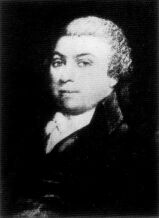Samuel Sewall (congressman)
| Samuel Sewall | |
|---|---|
 |
|
| Member of the U.S. House of Representatives from Massachusetts's 10th district |
|
|
In office December 7, 1796 – January 10, 1800 |
|
| Preceded by | Benjamin Goodhue |
| Succeeded by | Nathan Read |
| Personal details | |
| Born |
December 11, 1757 Boston, Massachusetts |
| Died | June 8, 1814 (aged 56) Wiscasset, Maine |
| Political party | Federalist |
| Alma mater | Harvard College |
| Occupation | Lawyer |
Samuel Sewall (December 11, 1757 – June 8, 1814) was an American lawyer and congressman. He was born in Boston, Massachusetts.
After attending Dummer Charity School (now The Governor's Academy), Sewall graduated from Harvard College (A.B. 1776, A.M. 1779, honorary LL.D. 1808) and set up practice as a lawyer in Marblehead. He served as a member of the state legislature in 1783, and from 1788-96.
He represented Massachusetts in the U.S. House of Representatives from 1796 to 1800, and from 1800 to 1814 served as a judge of the Massachusetts Supreme Judicial Court, becoming Chief Justice in 1814. He died at Wiscasset, Massachusetts (now Maine) while holding a court there. He was elected a Fellow of the American Academy of Arts and Sciences in 1801.
American novelist Louisa May Alcott was Sewall's great niece. His younger sister, Dorothy, was Alcott's great-grandmother. In 1781, he married Abigail Devereux; they had a family of at least six sons and two daughters. Sewall's great-grandfather Samuel Sewall was a judge at the Salem witch trials in colonial Massachusetts, and subsequently Chief Justice of Massachusetts.
Sewall was elected a member of the American Antiquarian Society on June 1, 1814. Sewall died 7 days later on June 8, apparently before he could formally respond, so his disposition regarding membership is unknown.
...
Wikipedia
